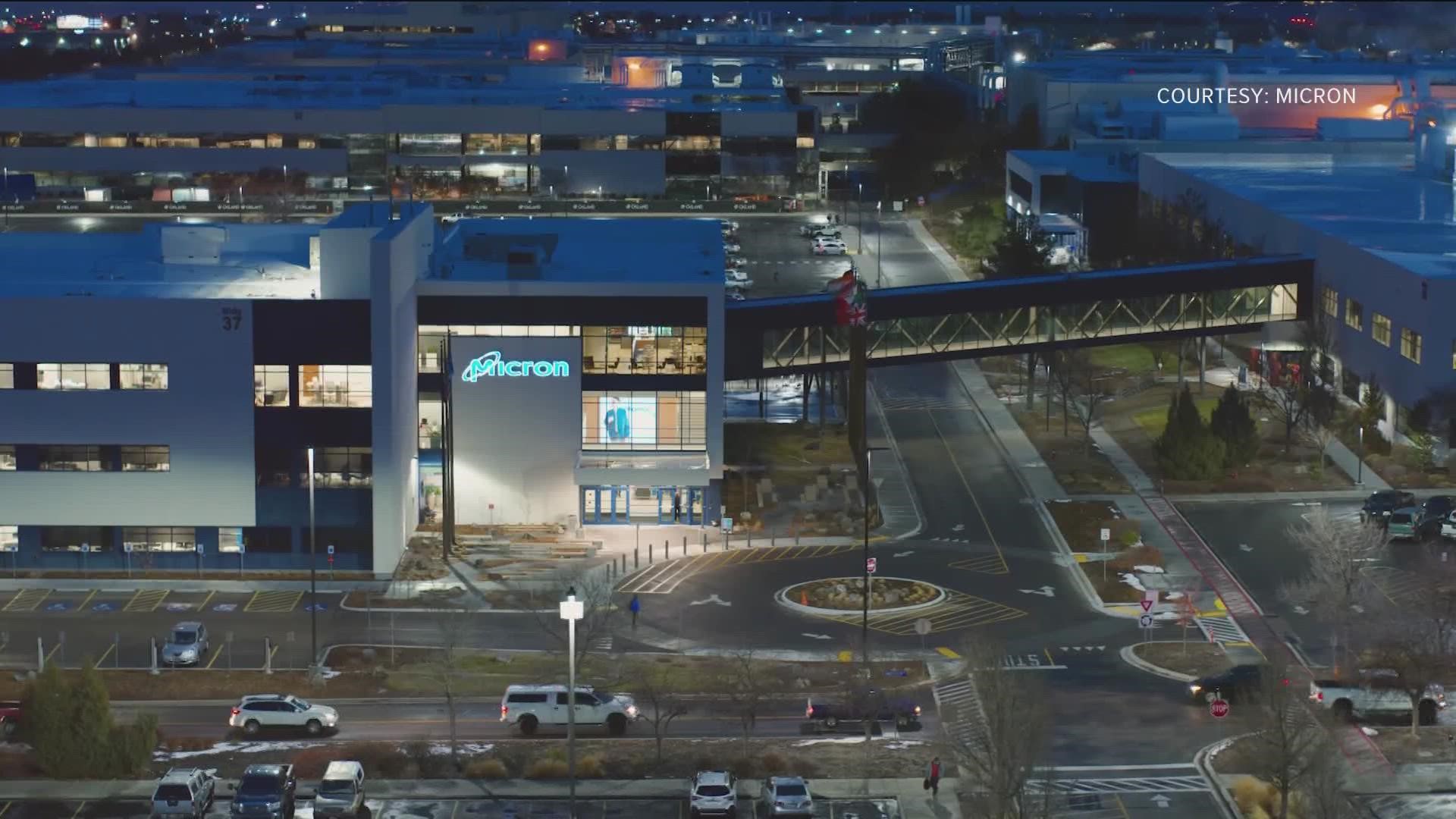BOISE, Idaho — Editor's note: Story updated since original publication to reflect City of Boise action, including City Council's approval of Micron's request to have 358 acres of land annexed by the city.
Eight weeks after Micron announced that the company will build a new fab for computer memory manufacturing in Boise, what the expansion will look like and how the company and the city are proceeding in what's expected to be a decade-long project are coming into sharper view. The first public city meetings related to the project are coming up in November.
A look at plans filed with the City of Boise reveals that, just physically speaking, the Micron project is a very, very big deal -- the new microchip fab, the central feature of the project, will have a footprint of about 1.2 million square feet. That's more than 20 football fields, or 10 times the area of the Ford Idaho Center Arena in Nampa, and that's just one floor. The gross area of the four-story building is listed at 4.85 million square feet.
"This is precisely the type of facility Congress intended to be constructed with the adoption of the CHIPS and Science Act in the summer of 2022," Micron architect Paul Marcolina wrote in a letter of intent to the City of Boise Planning and Development Department.
As Micron stated in its initial announcement, the company anticipates that by 2029, its project will bring to the Boise area more than 2,000 direct Micron jobs and 17,000 other jobs to support the expansion.

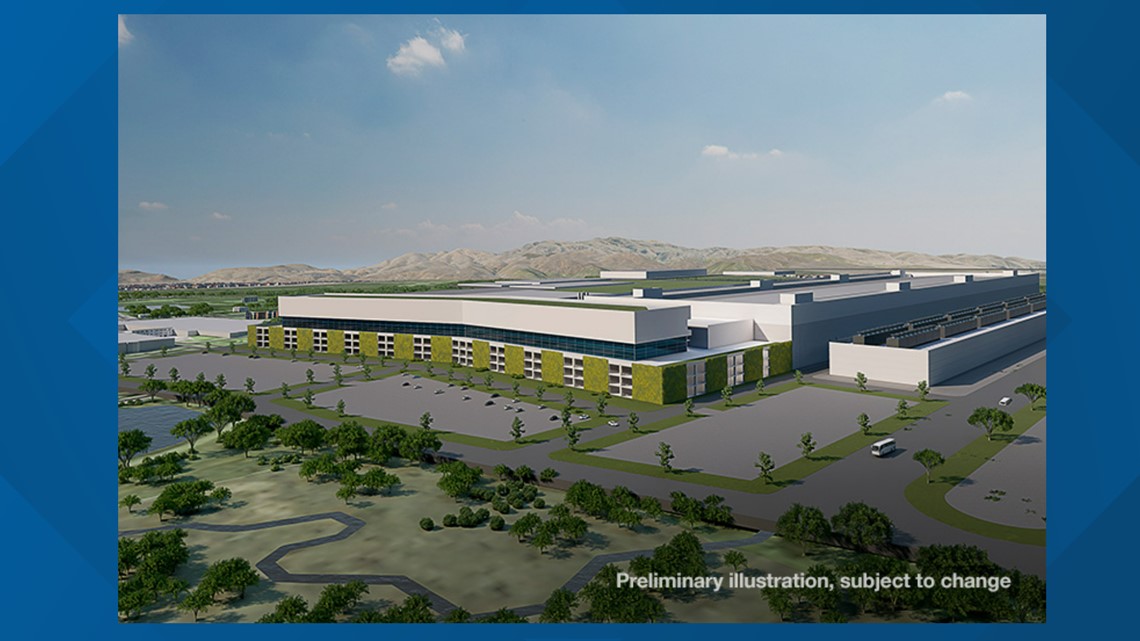
In addition to and in support of the fab, other facilities in Micron's expansion plans include:
- A water treatment facility to ensure incoming water meets Micron's high-purity specifications for manufacturing in the fab. Micron says any excess wastewater will be fully treated before being discharged into the City of Boise's treatment facility. Water sources include on-site groundwater and service from Veolia. The City of Boise is also working on a new citywide water renewal plan, being financed through a bond measure approved in 2021. Boise Public Works director Steve Burgos said bond financing is not being used for Micron's portion of the project.
- A gas plant that will use two columns and cold rooms to separate oxygen, nitrogen and other gases from ambient air. Those gases will be used in the fab. Micron says each column needs to be 185 feet tall.

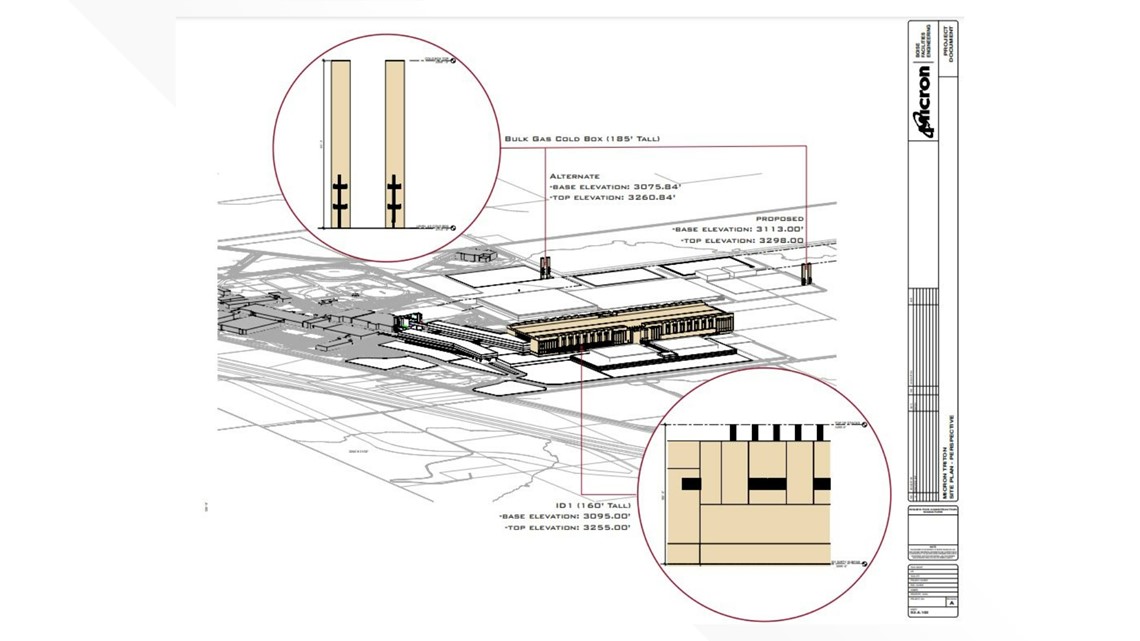
- Administration building, expected to be about 440,000 square feet, designed to provide office space and other accessory amenities such as a wellness center and fitness center for the approximately 2,000 new employees needed to operate the fab. The building will be on a podium parking structure that will provide about 3,600 parking spaces.
- Probe building: This 365,000 square-foot building will be adjacent to the new administration building and connected to the fab. About 85,000 square feet on the upper floor will be clean-room space where functionality testing on silicon wafers is completed before the wafers are transferred to the fab to be made into microchips.
- TD fabrication building: This is an expansion of the existing TD wafer manufacturing facility. The new building, called B51X, will add about 92,000 square feet to the existing B51 building.
- A central utility building expected to be about 450,000 square feet.
- Additional warehousing area for manufacturing inputs. A production support building expected to be about 350,000 square feet, and will be connected to the bulk specialty gas storage area.
- Micron will expand its existing mask manufacturing facility by about 30,000 square feet. Micron explains that this facility involves the manufacturing of masks, or "reticles," that are used to imprint data on wafers through the lithography process.
- A net additional 3,300 parking spaces on Micron's Boise campus.

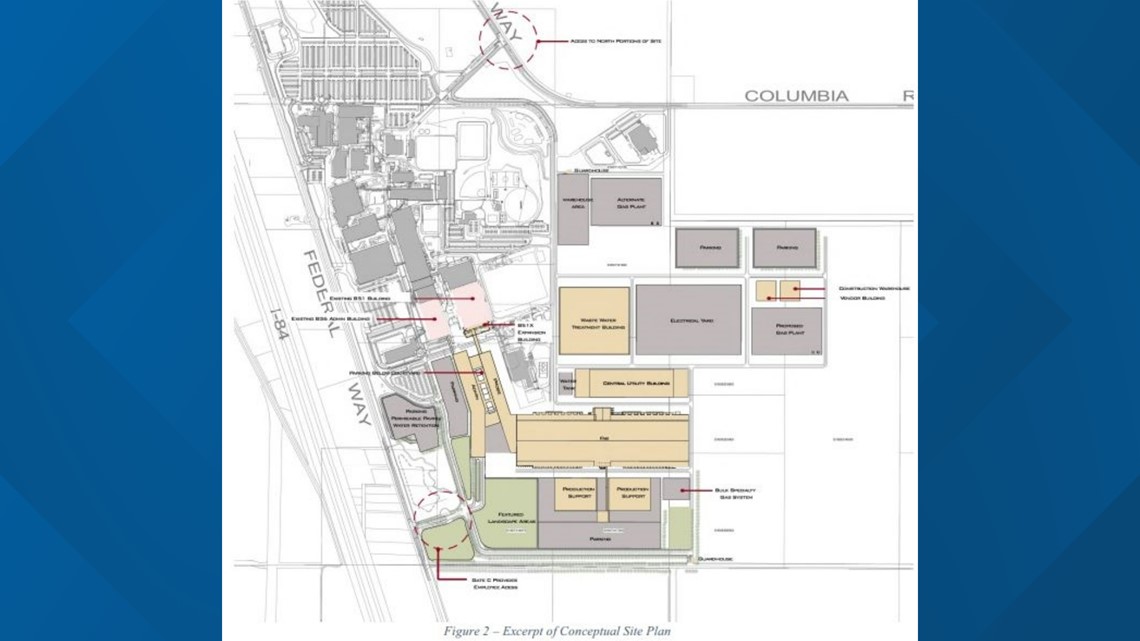
The construction isn't starting just yet. Micron and several government agencies, including the City of Boise, have some business to take care of over the next several months and years during both the planning and construction processes. The construction is expected to take place in phases over the next 10 years.
In a presentation to the Boise City Council during its Oct. 25 strategic planning session, Boise Planning and Development Director Tim Keane said the department plans to add two staff positions in its Buildings division that would be dedicated to the Micron project.
In response to questions about how those new positions will be funded, Keane said permitting for the Micron work is going to generate a "substantial amount of revenue," adding that his department and Micron have been in discussions about what the fees will be. City records indicate $3,415 in outstanding fees as of Oct. 18, the date of Micron's initial filing. Keane also said that the Micron project is going to be a multi-year commitment and responsibility.
The City Council on Nov. 1 unanimously approved an interim budget change for the two new Planning and Development positions and 11 other full-time-equivalent (FTE) positions. Details in the agenda packet indicate the interim budget changes include:
- Public works request for a one-time $15 million appropriation increase in Water Renewal Fund to initiate a project for the planning, design, and project development work related to an expanded, new recycled facility that also would serve the Micron fab. The increase would be split evenly between support from Micron and the city's Water Renewal Fund.
- The addition of 13 FTE positions for Public Works, Planning and Development and Legal departments to support the Micron expansion -- ongoing expense of about $1.25 million. Public Works is requesting approval for 9 of those additional positions. The Planning and Development Services request is for one plans examiner and and one building inspector. The legal department is requesting one additional municipal attorney and one additional paralegal. The accompanying statement for this item states that city staff request those additional positions "for the city to support the Micron expansion, and not erode city service provision elsewhere.... The City and Micron are currently working to develop a funding agreement to ensure the city is appropriately reimbursed for costs associated with the project."
Micron's application for annexation of one parcel, a rezone of another, and a conditional use permit was approved unanimously by the Boise City Council during its Dec. 6 meeting.

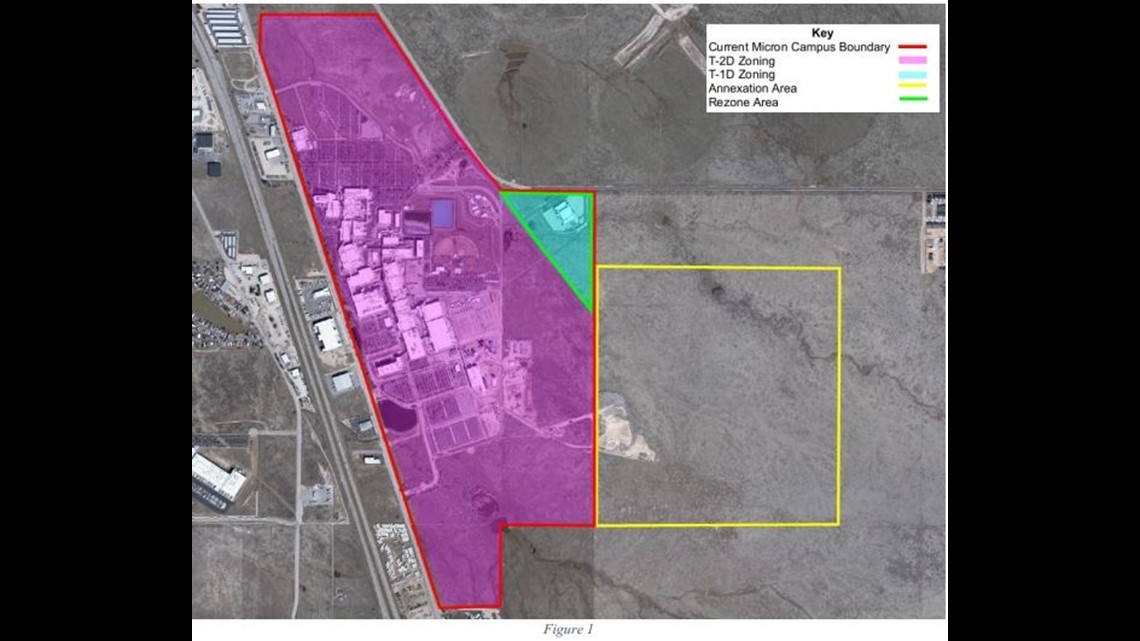
Micron requested that the city annex 358.2 acres located at 8000 S. Federal Way, to be zoned as T-2D/DA, which means "technological manufacturing with design review and development agreement."
The rezone application was to reclassify 32.1 acres of land located at 3851 E. Columbia Rd. from T-1D to T-2D/DA.
The conditional use permit is necessary because the planned 160-foot height of the fab and 185-foot height of two columns for the gas plant exceed the height standard of 150 feet for the T-2 zoning district.
Letters to the city from the Idaho Transportation Department and Boise Public Works indicate that those agencies do not object to the height exception.
Keane said Micron's building permits can be issued in phases allowing the company to "proceed as quickly as possible with construction."
"So we'll be hand-in-hand with them, as we are with other applicants, to make sure we're being as deliberate and efficient with our time," Keane said.
Other issues related to the Micron project include ensuring members of the company's growing workforce have places to live and ways to get to and from work.
Sean Keithly with the Boise Mayor's Office on Oct. 25 said the city will use its regulatory and policy tools to support the private sector's ability to build new housing and to move forward with "significant housing initiatives already underway" with the City of Boise.
For Micron employees who are also parents, the company plans to open a childcare facility across from its headquarters. Planning for the center, to be operated by Treasure Valley Family YMCA, is underway, Keithly said.
Regarding transportation, Keithly said the city is working with Valley Regional Transit to study possible new routes.
The Micron expansion and the estimated 2,750 employees and onsite vendors at the new fab will likely have a significant impact on traffic in a large portion of southeast Boise. A study prepared by NV5 finds that new development will produce 6,147 car and truck trips per day, with 11% of those trips occurring between 7 and 8 a.m. and 10% occurring between 4 and 5 p.m. Potential road work such as new turn lanes will ultimately be determined by the Ada County Highway District and Idaho Transportation Department.

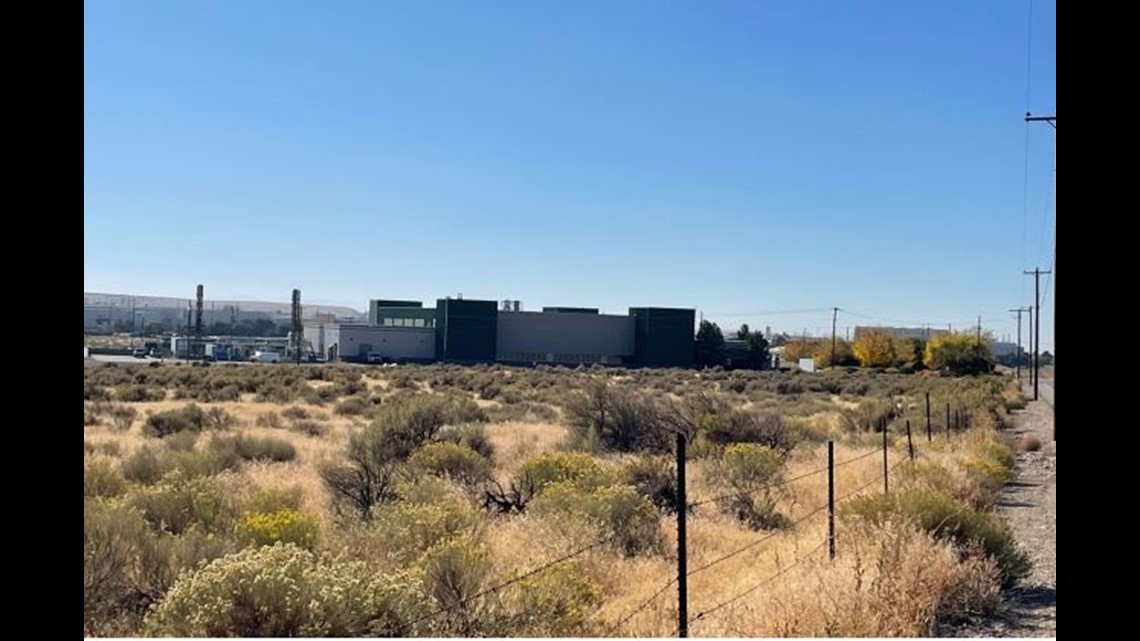
The project now in the planning stages for Boise isn't the only major expansion news for Micron. The company in early October announced that it intends to build a semiconductor plant in Clay, New York, near Syracuse, and invest up to $100 billion there.
President Joe Biden, who also hailed Micron's Boise announcement in September, said in a Twitter post that the company's investment in New York is "going to increase America's share of global memory chip production by 500 percent."
The president views the planned Micron fabs in both Idaho and New York as results of the CHIPS and Science Act, which appropriates $52 billion to boost the U.S. semiconductor industry and reduce the nation's dependence on chips made in China, Taiwan and South Korea.
Watch more 'Growing Idaho':
See the latest growth and development news in our YouTube playlist:

